May 25, 2025 | 18:45 GMT +7
May 25, 2025 | 18:45 GMT +7
Hotline: 0913.378.918
May 25, 2025 | 18:45 GMT +7
Hotline: 0913.378.918
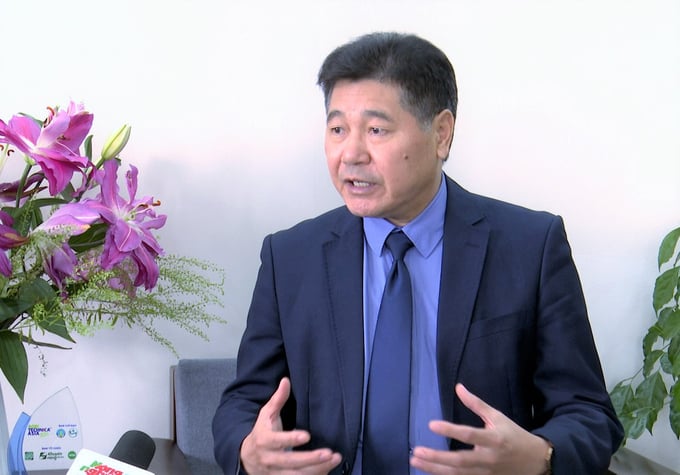
Dr. Le Quoc Thanh, Director of the National Agricultural Extension Center (NAEC). Photo: Pham Hieu.
Over the years, the Government and the agricultural sector have paid attention and come up with many solutions to accompany people in rice production, especially in the Mekong Delta region. A mentionable example is the Vietnam Sustainable Agricultural Transformation Project (VnSAT). This project is funded by the World Bank (WB) and under the management of the Ministry of Agriculture and Rural Development (MARD), which ended with great success.
Following the policy of the agricultural sector, many businesses have also begun to apply scientific and technical solutions in rice production to improve productivity, quality, reduce costs, save materials and lower the emissions level.
Particularly in the case of NAEC, the center has cooperated with Binh Dien Fertilizer JSC to apply technical advances in production in 13 rice-producing provinces of the Mekong Delta region. It is a good sign as businesses have seen the need for sustainable development of the rice industry in the Mekong Delta and stepped in.
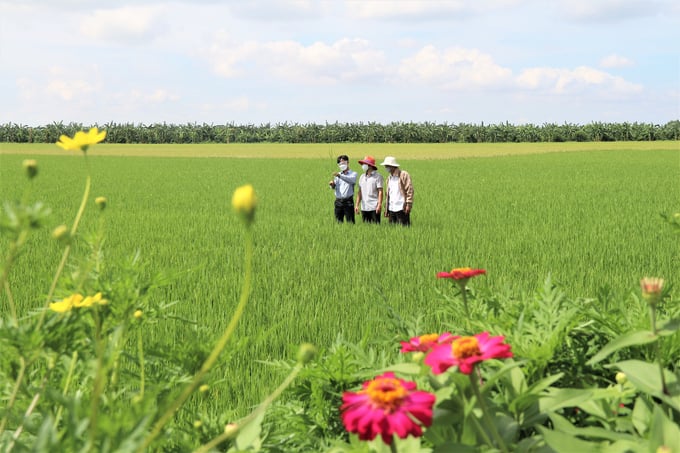
Companies along with the agricultural extension system are implementing many cooperation programs to quickly spread rice farming solutions to reduce emissions. Photo: Pham Hieu.
Within the framework of cooperation, NAEC and Bayer Vietnam Co., Ltd are currently building future rice production models (forward farms) that integrate cost-efficient solutions, aiming to reduce emissions in Can Tho. The two units pledge to strengthen the capacity of producers, help people master technology, reduce costs and emissions without affecting productivity, and even increase crop quality.
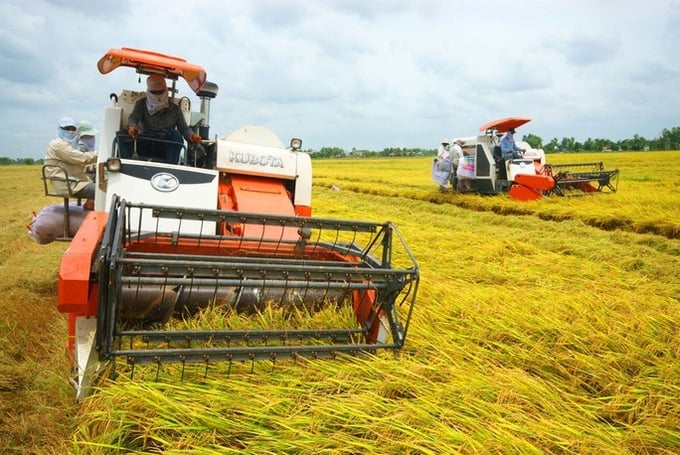
Many businesses have become more interested in applying scientific and technical advances to produce rice in a sustainable manner. Photo: Ngoc Trinh.
It can be said that activities to transfer technical advances around rice production have been synchronously and widely deployed by NAEC in most localities of the Mekong Delta. In September this year, NAEC and its partners will review, evaluate, summarize and adjust technological processes as well as solutions to continuously update and promote rice production models that reduce costs, improve productivity, quality and develop sustainably.
It is necessary to acknowledge that the application of low-emissions rice production methods in Vietnam still poses ample limitations, which is not as expected. System of Rice Intensification (SRI) can be considered a prime example. It has become a familiar concept in Vietnam, popular among farmers, but unable to show its full potential due to difficulties in the process of field planning and production organizing.
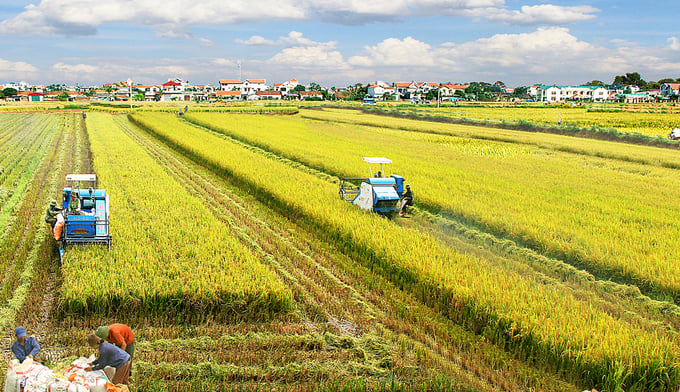
Field planning and production organizing play an important part in making the implementation of the orientation of sustainable, low-emissions rice production feasible and effective. Photo: LHV.
If each farmer household produces on their own field with each different rice variety in different periods, it will be difficult to aim for large-scale production. We still want to create “big paddies”, but if there are still different soils, crops, rice varieties, the fields will never be "big", and the application of technological advances to reduce emissions like SRI will remain a challenge.
The strategy of low-emissions rice production requires synchronous solutions from field planning, irrigation, big paddies organization to production linkage. We need to highlight the role of the "vertical connection" between farmers and production organizations enterprises, as well as the "horizontal connection" between one cooperative to another, the same for businesses.
Up to the present date, it can be said that the State and the Government of all levels have accompanied farmers and businesses to sustainably develop the rice industry. Many enterprises have invested and closely associated with farmers, transferring technical advances into production, creating a source of high-quality rice for export while also making sure that the industry is walking on the right track towards low-emissions rice production.
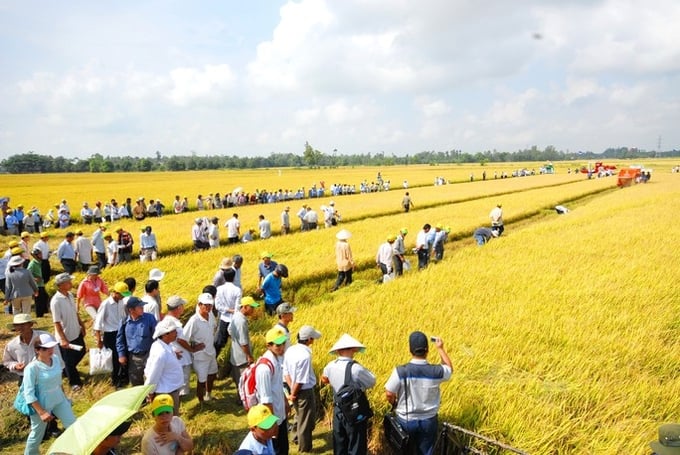
Although businesses in the rice industry are dedicating their efforts to the overall progress of the industry, many of them stay indifferent and irresponsible. Photo: LHV.
However, we have to frankly admit that there is still indifference, irresponsibility, and the "take full advantage" mindset of many rice enterprises, even large ones. It is essential to strongly condemn this situation because it is because of this indifference that the development process of the rice industry as we desire has been slowed down.
In reality, there are cases when this type of enterprise does not make big investments, has little to zero contribution to society, but gains immense profits, much more than businesses dedicating to the common goal.
We need to look directly into this matter, then develop sanctions and regulations. Enterprises wishing to purchase, process and export rice should have stricter conditions to participate in the market and production linkages to ensure the sustainable development of the rice industry.
Translated by Samuel Pham
/2025/05/25/4127-3-073637_820.jpg)
(VAN) Thanks to the promotion from an FAO-implemented project, vegetable production in greenhouses in Moc Chau has seen strong development, from 1.5 hectares in 2021 to nearly 50 hectares in 2024.

(VAN) FAO has recently supported USD 140,000 to implement the project 'Risk mitigation human-animal interface risks through disease control initiatives in pig farming.'

(VAN) The People's Committee of Tra Vinh province has approved an adjustment to the investment policy for the Green Hydrogen Plant project, increasing its area to approximately 52.76 hectares.
![Reducing emissions from rice fields: [2] Farmers’ commitment to the soil](https://t.ex-cdn.com/nongnghiepmoitruong.vn/608w/files/news/2025/05/05/dsc08881jpg-nongnghiep-140632.jpg)
(VAN) Clean rice cultivation model in Thuong Tan commune, Bac Tan Uyen district, is assisting local residents in achieving sustainable agriculture by substantially reducing costs, increasing productivity, and protecting the environment.

(VAN) At the conference to disseminate Resolution No. 68, AgriS introduced its digital agricultural ecosystem and reaffirmed its commitment to accompanying the Government in promoting private sector development and sustainable agriculture.

(VAN) 'Blue Ocean - Blue Foods' initiative is designed to restore marine ecosystems and establish sustainable livelihoods for local communities by cultivating a minimum of 1,000 hectares of cottonii seaweed in the first three years.
/2025/05/21/4642-3-112707_603.jpg)
(VAN) The V-SCOPE project has made direct contributions to three out of six pillars of the Comprehensive Strategic Partnership between Vietnam and Australia.